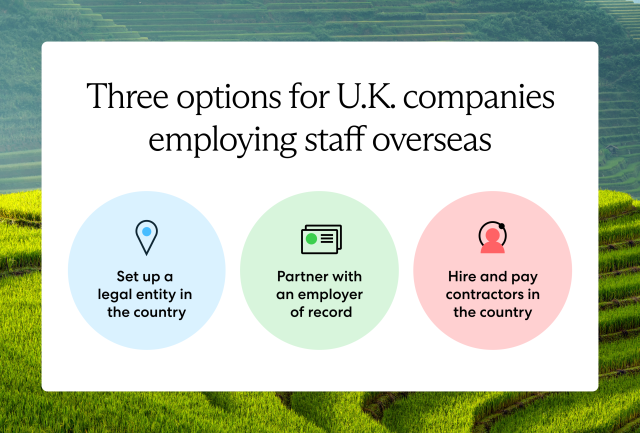Hiring internationally offers U.K. companies many advantages, from accessing talent with new perspectives and innovative ideas to offering added cost savings.
Still, hiring talent across borders comes with unique hurdles, such as clarifying your corporate tax liability and correctly classifying talent. International companies must do their due diligence and ensure compliance to avoid setbacks while building a global workforce.
This guide covers everything U.K. companies need to know about hiring foreign employees, from calculating total employee cost to mitigating risk. Plus, learn how to hire talent in any market without setting up a local entity.
Can U.K. companies hire foreign workers?
Yes, U.K. companies can hire foreign workers. By establishing a foreign entity, partnering with an employer of record (EOR), or hiring international contractors, U.K. companies can hire talent worldwide. The best approach for your business depends on your long-term expansion goals.
3 options for a U.K. company hiring foreign employees
U.K. companies have three options for hiring foreign employees: establishing a legal entity, partnering with an employer of record (EOR), or hiring international contractors.
We discuss each approach in detail below.

Establish a foreign legal entity
If you plan on building a sizeable international team and anticipate a long-term presence in your target market, entity establishment may be the wisest approach for your business.
Establishing a legal entity cuts down on long-term hiring costs by allowing you to hire local talent directly. With this approach, you also retain control over employment logistics, from hiring and onboarding to running payroll for your international team.
Still, entity establishment is time-consuming and costly, involving significant up-front investments and ongoing maintenance costs. Plus, you remain fully responsible for ensuring compliance with local employment and tax regulations, and you must wait several months before you can legally engage local talent.
Entity establishment is a cost-effective and scalable approach for establishing a long-term presence in a foreign market. If you aren’t ready to undergo lengthy incorporation procedures and invest in physical infrastructure, consider partnering with an employer of record (EOR) instead.
Partner with an employer of record (EOR)
A streamlined approach to hiring foreign employees is to partner with an EOR. An EOR is a third-party entity that takes the guesswork out of hiring internationally. By partnering with an EOR, you can eliminate the need for entity establishment and ensure compliance as you enter new markets.
As the legal employer of your global workforce, an EOR handles everything from hiring, onboarding, immigration, and compliance to running global payroll, administering global benefits, and offering ongoing HR support to your international team on your behalf.
Consider the following example: a U.K. consulting firm wants to hire a small team of Canadian consultants to explore a new business offering in Canada; however, they want to test the waters of the local market before making long-term investments.
By partnering with an EOR, the U.K. employer can save on upfront costs and quickly and compliantly source top talent in the Canadian market without the added burden. Over time, the employer can change course, as needed, by scaling back or undergoing incorporation.
Learn more: What Is an Employer of Record (EOR)?
Engage international contractors
Hiring international contractors is a great option for U.K. businesses that need to hire specialized talent for short-term projects.
This approach offers added flexibility and low commitments. Global companies that engage international contractors save valuable time and resources they would otherwise invest in hiring, onboarding, and paying a team of full-time employees. Still, hiring contractors overseas comes with a serious misclassification risk.
While classifying contractors seems straightforward, variations in worker designation laws worldwide pose a risk for foreign employers unfamiliar with local regulations. Working relationships evolve, and classification criteria change. As a result, foreign employers can unknowingly find themselves noncompliant.
For example, maintaining an ongoing relationship with a contractor and establishing regularly scheduled payments constitutes an employment relationship in many countries. Misclassification penalties include hefty fines, employee backpay, tax arrears, and extensive litigation.
We cover this topic in greater detail later on.
Learn more: Should You Hire a Contractor or an Employee?
Compliance risks for U.K. companies hiring foreign employees
When employing staff overseas, U.K. companies face unique compliance risks. Familiarizing yourself with local employment and tax regulations in your target market is critical for success.
The primary challenges U.K. companies face when building a global workforce include navigating unfamiliar employment laws, correctly classifying talent, running compliant global payroll, clarifying permanent establishment status, and processing immigration requirements.
We discuss each of these in detail below and offer tips on mitigating risk.
Unfamiliar employment laws
One of the most challenging aspects of hiring across borders is navigating federal, state, and local employment regulations in each jurisdiction where you hire talent.
Before a U.K. company employs staff overseas, it should familiarize itself with local federal employment regulations in its target markets, such as minimum wage guarantees, income tax brackets, and statutory withholdings.
You’ll need to clarify regional regulations as well. For instance, check if the state minimum wage differs from the federal minimum, identify local levies you must withhold from employee salaries, and determine the regional public holiday schedule.
Local employment regulations become even more complicated in countries that rely on collective bargaining agreements (CBAs). A CBA is a set of provisions that employers, employment organizations, and trade unions negotiate with one another that amend or supplement federal employment regulations.
For example, CBAs in Europe provide additional regulations on top of federal and state provisions for minimum wage, leave entitlements, overtime pay, and other labor protections. Some apply only to individual employers, while others apply industry-wide.
Navigating unfamiliar employment and tax regulations at each level of government across all industries in a foreign market puts U.K. companies at risk of fines, limited business opportunities, and other noncompliance penalties.
Consider partnering with a third-party legal entity with experience in your target market to mitigate risk.
Misclassification
As previously mentioned, hiring contractors offers employers unique cost savings. However, companies that choose this route must be careful how they treat their contractors.
Federal regulators in many countries have established worker classification provisions to prevent companies from hiring contractors for cost savings while treating them like employees. These provisions are often highly nuanced and leave ample room for interpretation to ensure employers don’t infringe on contractor freedoms.
In many jurisdictions, simply offering work equipment to a contractor or influencing their work schedule constitutes an employment relationship and subjects the client to fines, employee backpay, benefits arrears, back taxes, and other penalties.
To ensure correct classifications as you build a global workforce, your HR team must conduct regularly scheduled audits to stay abreast of changing workplace dynamics and evolving classification statutes.
Read more in our complete guide to employee misclassification.
Incorrect payroll contributions
Running compliant global payroll is another one of the most challenging aspects of managing an international team, especially if you hire talent in multiple markets.
Mandatory payroll taxes and contributions vary drastically between countries, creating a severe compliance risk for U.K. companies unfamiliar with local regulations.
For example, employer contributions in India to the Employees’ Provident Fund (EPF) and the Employees’ State Insurance (ESI) amount to roughly 16.75% of the employee’s base salary. Employee contributions amount to 13.75%. However, in the U.S., employers and employees pay only 7.65% in payroll taxes and contributions.
Ensuring accurate withholdings is critical for avoiding fines and upholding the value of your business in the local market. Plus, offering timely payments to your team reduces employee churn and helps you build a cohesive, committed workforce.
Many U.K. companies partner with in-country legal experts with experience in local payroll and tax regulations to avoid noncompliance penalties, such as fines and limited business opportunities.
Read more in our complete guide to payroll tax.
Permanent establishment
When a company does business in any capacity in a foreign market, it risks triggering permanent establishment (PE) status and subjecting itself to local corporate taxation.
Most countries define a permanent establishment as any foreign organization that regularly performs income-generating activities through a fixed place of business in the local market. Like payroll and misclassification regulations, permanent establishment laws are highly nuanced and vary worldwide, creating a major compliance risk for foreign employers.
For instance, any U.K. company that regularly conducts ongoing business from a physical location in the Netherlands is a PE and must pay local corporate taxes. Enlisting a local agent who regularly exercises the authority to close contracts on behalf of your U.K. business also constitutes a PE.
And in Colombia, any foreign company that generates income in the local market faces corporate taxation, regardless of whether or not it is a PE.
Overlooking your corporate tax obligations abroad results in fines and costly litigation. By partnering with a third-party legal expert, like an EOR, you can mitigate PE risk. However, compliance is your responsibility if you employ foreign talent via a local entity or engage local contractors. Be sure your HR team has the necessary resources and experience to ensure compliance.
Immigration requirements
When engaging talent in foreign markets, you’ll most likely hire local citizens or individuals with long-term residency permits who don’t need work visas.
Still, as the world of work becomes increasingly decentralized, global mobility has become critical for talent retention. Today, people value the opportunity to work from anywhere. Allowing employees to relocate internationally improves employee satisfaction, helps attract top talent, and reduces churn.
Whether you need to hire a foreign national located in your target market or you want to relocate a domestic employee abroad, you’ll need an HR team that can swiftly navigate immigration procedures.
Selecting visa categories, collecting documents, acquiring necessary authorizations, and scheduling appointments can delay relocation schedules and interrupt daily workflows. Quickly securing needed visas keeps talent happy and mitigates costly disruptions.
Plus, some countries require visa registration and other formalities upon arrival. Failing to comply with immigration requirements can lead to fines and visa refusals. Be sure to hire an experienced HR team and provide them with the necessary resources to ensure ongoing compliance.
FAQ for a U.K. company employing staff overseas
Below, you can find answers to commonly asked questions about U.K. companies employing staff overseas.
Can I put overseas employees on U.K. payroll?
Yes, you can put overseas employees on U.K. payroll. However, U.K. companies with international teams can streamline global payroll and ensure compliance by outsourcing payroll to a third-party expert, such as an in-country payroll provider or global payroll partner.
By offloading payroll to an in-country payroll provider in your target market, you shed the burden of navigating foreign tax and withholding regulations on your own. This is an ideal option for companies that hire talent in a few foreign markets.
If you hire across multiple markets, the ideal approach is to partner with a global payroll partner. A global payroll partner leverages worldwide infrastructure and international legal expertise to streamline payroll for distributed teams while mitigating risk.
A global payroll partner consolidates all payroll processes into a single integrated platform, simplifying payroll for teams across multiple markets. This approach helps you stay compliant, consistent, and efficient while paying international talent.
Can I sponsor a foreign worker in the U.K.?
Yes, U.K. employers can sponsor foreign workers in the U.K. You must acquire a sponsor license and ensure that your work contract complies with U.K. minimum wage guarantees, working time regulations, and necessary visa criteria.
Due to Brexit in 2020, U.K. employers must also acquire a sponsor license to employ talent from EU countries, plus Iceland, Liechtenstein, Norway, and Switzerland.
Compliantly employ staff overseas with Velocity Global
Tapping into the global talent pool offers U.K. companies endless opportunities, from cost savings and access to new markets to workforce diversification. Expand your reach, lower your financial commitment, and mitigate risk by partnering with Velocity Global.
With worldwide infrastructure and international legal expertise, Velocity Global makes it easy for U.K. companies to hire talent in over 185 countries without setting up foreign entities or worrying about violating local employment laws.
Our EOR solution helps U.K. companies build international teams and perform complex operations along the way with far less risk, such as running global payroll and correctly classifying international employees.
We handle everything from hiring, onboarding, immigration, and compliance to administering global benefits and providing ongoing HR support on your behalf.
Let us do the heavy lifting so you can build a global workforce without the added burden. Contact us today to get started.
Topic:
Country Guides



